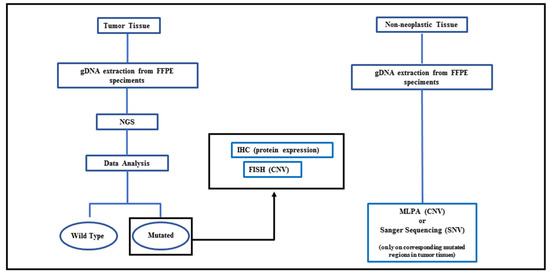Hereditary Gastrointestinal Cancer Syndromes: Molecular Basis of Onset and Progression, Molecular Diagnosis, and Precision Therapy
A topical collection in Biomedicines (ISSN 2227-9059). This collection belongs to the section "Cancer Biology and Oncology".
Viewed by 4094Editor
2. Ceinge Biotecnologie Avanzate, 80131 Naples, Italy
Interests: hereditary colorectal cancer; gastrointestinal polyposis syndromes; sporadic colorectal cancer; epithelial to mesenchymal transition; cancer stem cell; molecular diagnosis; precision medicines; cancer resistance to therapy
Special Issues, Collections and Topics in MDPI journals
Topical Collection Information
Dear Colleagues,
This Topical Collection, entitle “Hereditary Gastrointestinal Cancer Syndromes: Molecular Basis of Onset and Progression, Molecular Diagnosis, and Precision Therapy” will mainly focus on the principal roles that hereditary gastrointestinal cancer predisposing syndromes plays on colorectal cancer incidence, the molecular basis of their onset and progression, the discovery of innovative therapies for disease management and care, and the standardization of novel approaches for early diagnosis and cancer prevention.
Colorectal cancer (CRC) is the third most frequent cancer worldwide. About 75% of all CRCs are sporadic cancers and arise following somatic mutations, while about 10% of all CRCs are hereditary cancers, among which are hereditary nonpolyposis colorectal cancer, adenomatous and hamartomatous polyposis syndromes, and gastric adenocarcinoma and proximal polyposis of the stomach. Affected patients are at increased risk for early onset, synchronous and metachronous colorectal cancers and/or adenomas, and extracolonic manifestations. Molecular diagnosis, which currently consists in the identification of pathogenic genetic variants in genes associated with both a high- and low-penetrance cancer risk, is an essential tool for cancer prevention, follow-up, counseling, and survival and represents the gold standard approach in the management of these syndromes. Endoscopic surveillance, polypectomy, and prophylactic surgery, needed for the management of affected patients, are all invasive clinical procedures, and chemoprevention, although it represents a very attractive perspective, is not to date a possible therapeutic alternative for patients. Therefore, there is a pressing need to develop effective, well-tolerated drugs.
We thus consider this subject to be of particular interest because new knowledge can help toward early asymptomatic diagnosis, cancer prevention, and standardization of new therapeutic approaches.
We invite authors to submit original research and review articles that focus on these aforementioned issues. Potential topics include but are not limited to:
- Hereditary gastrointestinal cancer syndromes;
- Adenomatous polyposis syndromes;
- Hamartomatous polyposis syndromes;
- Hereditary nonpolyposis colorectal cancer syndrome;
- Early diagnosis;
- Novel diagnostic and prediction biomarkers;
- Precision therapy.
Prof. Dr. Marina De Rosa
Collection Editor
Manuscript Submission Information
Manuscripts should be submitted online at www.mdpi.com by registering and logging in to this website. Once you are registered, click here to go to the submission form. Manuscripts can be submitted until the deadline. All submissions that pass pre-check are peer-reviewed. Accepted papers will be published continuously in the journal (as soon as accepted) and will be listed together on the collection website. Research articles, review articles as well as short communications are invited. For planned papers, a title and short abstract (about 250 words) can be sent to the Editorial Office for assessment.
Submitted manuscripts should not have been published previously, nor be under consideration for publication elsewhere (except conference proceedings papers). All manuscripts are thoroughly refereed through a single-blind peer-review process. A guide for authors and other relevant information for submission of manuscripts is available on the Instructions for Authors page. Biomedicines is an international peer-reviewed open access monthly journal published by MDPI.
Please visit the Instructions for Authors page before submitting a manuscript. The Article Processing Charge (APC) for publication in this open access journal is 2600 CHF (Swiss Francs). Submitted papers should be well formatted and use good English. Authors may use MDPI's English editing service prior to publication or during author revisions.







